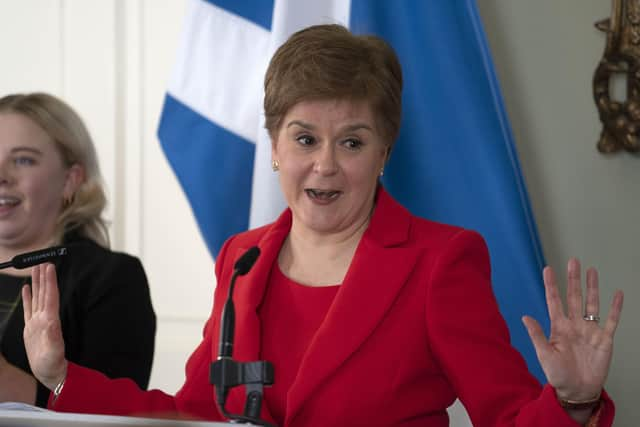Scottish independence: Nicola Sturgeon's embrace of fantasy economics in style of Liz Truss will lead to trouble – John McLaren
It doesn’t have to be like this, it could be, as Nicola Sturgeon claims she wants, a “grown up and honest” debate instead.
In terms of the economic arguments, on the downside, there are risks from breaking up a close economic union and a political union which incorporates a significant benefit in terms of how public spending is distributed across the UK. On the upside, there are the potential positives from introducing a more growth-friendly migration policy and energy-related advantages, both renewables and carbon based.
Advertisement
Hide AdAdvertisement
Hide AdGiven the horlicks that the current UK Government has made of economic policy, there is also potential to show that a Scottish Government would be a better bet to guide the economy in a more stable and prosperous way. So the incentive is there for the Scottish Government to avoid Brexit-like fantasy arguments and accept economic orthodoxy, what the ‘experts’ have to say, and go on the front foot. But not with what was published earlier this week.
A core fantasy is that Scotland will not necessarily need to adjust its fiscal position after independence. It will, as the SNP’s Growth Commission acknowledged in 2018. The latest paper on the economics of independence naively cited work by the Institute for Fiscal Studies (IFS) as a partial smokescreen to avoid addressing how to close the gap between government revenues and spending in Scotland.
Sure enough, within hours, the IFS retorted that its position was that “it is highly likely an independent Scotland would need to make bigger cuts to public spending or bigger increases to taxes in the first decade following independence than the rest of the UK”. This highlights one of the problems with the SNP’s current approach, the extreme caution shown over doing anything different from what it will inherit. The funding shortfall needs to be admitted and options to close it explored.
On spending, some areas, like defence, could clearly be cut from UK equivalent levels, while the benefits system as a whole might be revisited. On taxes, there is huge scope to introduce more economically efficient, greener and more progressive taxes with regards to property, roads and much more. They should try looking to the IFS again, but this time to the Mirrlees Review of the tax system that has been studiously ignored by successive UK Governments. Yet the latest publication has even less to say on tax and spend changes than the Growth Commission report of 2018 or the 2013 White Paper.
Most people probably accept that some things will have to, and some things should, change as a result of independence. Scepticism over the probable outcome is likely to increase when they are not presented with a version of what these changes might be. Not a definitive list perhaps but at least a reasonable representation of what might be involved. Avoiding any such outline is not levelling with the Scottish people.


Then there are the markets. The lesson of the economic mess of the last few weeks is that unrealistic fiscal plans, based on ideological dogma, will result in a hammering from the markets. Any Scottish Government approaching independence day would have to present realistic sums, accepted as such by respected independent bodies, or face a quick retreat once their plans were given the thumbs down.
This should be a lesson well learnt. You can kid yourself that publishing umpteen briefing papers means that the groundwork has been done. However, when each of these papers provides little real clarity then, as the time comes for others to judge, you may find yourself, like Liz Truss over the past week, having to sheepishly accept what you had previously denied.
The same applies to currency, trade, borders and membership of the European Union. A hard look at the facts and at what is in Scotland’s interests, rather than what looks good viewed through an anti-Westminster perspective, is sorely needed.
Advertisement
Hide AdAdvertisement
Hide AdThe apparent prejudice shown against the UK and in favour of the EU model, or the small European countries model, is just a veneer. It distracts from the ‘being pretty much like the UK, but within the EU’ vision that is actually being proposed. A proper assessment is required, one that considers what Scotland's model should be, based on its circumstances, perceived values, and social and economic priorities.
Politically, there would seem to be clear advantages in setting forth a bold economic vision and stating that this would be steered towards even if some unwanted compromises were needed, for example higher taxes than initially intended. A simple example would be a commitment to extensive free childcare, alongside high-quality early years investment and a commitment to resilient – ie, well-maintained – public services. This would allow for a valid claim to improving future economic activity, productivity and equality.
But no such vision exists. Instead, the approach appears to be relying on a mixture of the unwavering support of die-hard Yes voters and the hope that anti-Westminster feelings will trump any economic reservations for those who are still swithering. Meanwhile, the economic fallout from such a timid approach will, as with Brexit, be addressed post-referendum.
That would be a divisive and ill-advised route to independence. An alternative vision needs to be expounded but, unlike Brexit, must be one based on reality.
John McLaren is a political economist who has worked in the Treasury, the Scottish Office and for a variety of economic think tanks
Comments
Want to join the conversation? Please or to comment on this article.